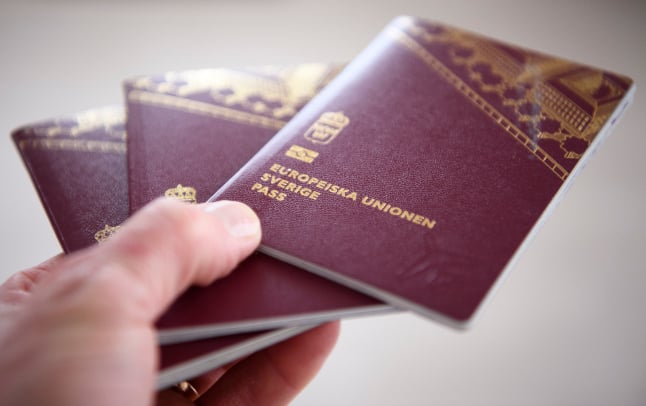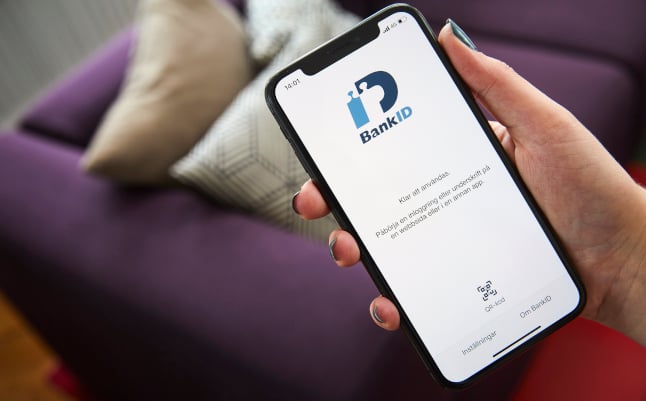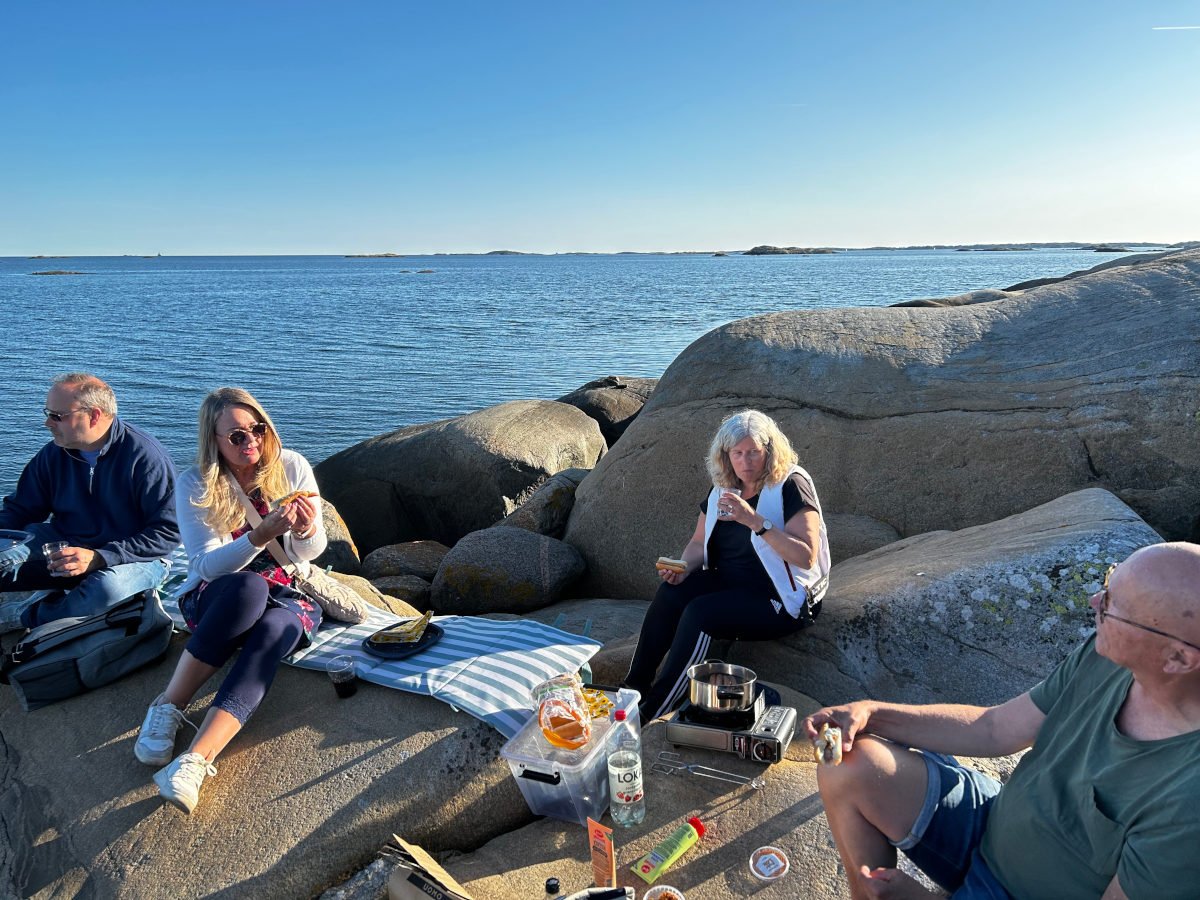When Charlie, a software developer from the US, contacted his bank to order his first BankID after moving to Sweden, he was surprised to learn that new rules about how customers verify their identity meant that he – as a foreign citizen – was no longer able to get one from his bank, despite having a Swedish personal number and ID card issued by the Tax Agency (Skatteverket).
This came after his bank, ICA Banken, changed its terms and conditions on January 10th, following a broader tightening of the rules of Sweden’s BankID system to improve security and crack down on ID fraud.
“Several expatriate friends had recommended ICA Banken for its ease of initial setup online. Since they were students when they got their accounts, they appreciated the relative speed and low financial requirements,” said Charlie, one of several readers who got in touch with The Local after they found they were affected by the new rules.
“We have been working systematically for six months to get residence permit cards, then a personal number, then a Skatteverket national ID card, and finally bank accounts. To our shock, we were just told by ICA Banken that the Skatteverket National ID – the only one available to non-citizens – is not a valid source of identification for BankID.”
More than eight million people in Sweden use electronic IDs in their daily lives, to do their banking, shop online or access vital public services – it is for example only possible to access your health records online if you have an electronic ID. Issued by ten banks, BankID is by far the most widely used.
But the recent rule change requires new users to have a Swedish passport or a national ID card issued by the Swedish police to verify the user’s identity when applying online for a mobile BankID if you don’t already have one (existing BankIDs won’t be revoked).
This is because these IDs contain a scannable chip, which can be validated digitally, meaning that the applicant can prove their identity online. But these forms of ID are only available to Swedish citizens, and the ID issued by the Tax Agency does not contain that chip.
“If you’re collecting your first BankID you should be able to go to your branch and confirm that you are you, using a physical ID, for example the Tax Agency’s ID and all other approved IDs (comparable to picking up a passport from the police). But if you’re collecting your first BankID remotely, you need a passport or a national ID card,” a BankID spokesperson told The Local in an email.
The spokesperson said that BankID and the banks follow the framework for electronic IDs set up by Sweden’s Agency for Digital Development (DIGG). “By scanning ID cards, a lot of people don’t have to visit a bank branch physically, which is much appreciated and requested. But those who do not have a passport or national ID card need to visit a branch.”
The spokesperson told The Local that so far not all banks had implemented the new rules, which it introduced last autumn. It remains possible for banks to accept IDs that are available to foreign citizens – such as a Swedish driving licence or the Tax Agency’s ID card – at for example an in-person meeting, which some banks in Sweden have chosen to do. But with banks in an increasingly digital society operating fewer and fewer brick-and-mortar branches, turning up at a physical location to confirm your identity in person is not always possible.
“Each bank must answer for its own checks and requirements, and we are aware that there are banks that are able to for example verify the customer’s identity at an office, which ICA Banken cannot,” a spokesperson for ICA Banken told The Local, adding that customers with an existing BankID can still use that to prove their identity and renew it online.
“We have assessed the risk we see based on our capacity as a distance bank, and decided that we were not able to offer driving licences as an option in certain circumstances where the customer does not have a previous BankID,” added the spokesperson.
ICA Banken’s website advises: “If you don’t have a Swedish passport or a national ID card issued by the police, you should get one of these.”
- WHAT YOU NEED TO KNOW: Which banks still let foreign citizens apply for a Swedish BankID?

Sparbanken Syd and the Skandia bank also confirmed that you need a Swedish passport or national ID to download a BankID from them, but a Skandia customer service officer stressed that it is still possible to use their banking services without a BankID.
Several other banks, however, told The Local they could still issue BankIDs to foreign citizens.
Nordea writes on its website: “If you don’t have a Swedish passport or a Swedish national ID card issued by the Swedish police, call customer service and we will help you. In a few cases, you have to visit one of our branches for in-person identification.”
SEB, Handelsbanken, Swedbank and Länsförsäkringar also confirmed to The Local that customers with a personal number and another kind of valid Swedish ID than a passport or police-issued national ID card could still visit their branches in person to get their first BankID. Ålandsbanken said that all of its customers had to make an in-person application to receive their first BankID.
Danske Bank, the remaining bank that issues BankID in Sweden, had not responded to requests for comments by the time of publication.
Another alternative for foreign citizens may be the Freja eID, which is used by many online services in Sweden but is not as widely accepted as BankID. Europeans may in some cases in Sweden also be able to use an electronic ID from an EU country.
An inquiry into Swedish ID cards proposes introducing a state-run electronic ID system in addition to the privately-owned companies that exist today, which would include allowing the police to issue national ID cards to foreign citizens. Such a system was originally proposed to come into force in January 2022, but the report is still being processed by the government and other authorities.
Many thanks to the members of The Local who got in touch for this article. You are always welcome to email [email protected] to send a news tip to our editorial team.





 Please whitelist us to continue reading.
Please whitelist us to continue reading.
This situation has its origins in the Government Report SOU 2019:14 regarding ID cards. The report contains 450 pages in Swedish, with a summary in English on pages 29-37. Basically, it says that ID cards issued by various agencies and organisations in Sweden only meet the SIS standard, which in the opinion of the Report is insufficient to prevent ID fraud. This includes even the Swedish Tax Agency’s ID card and the Swedish driving licence because the photograph is provided by the applicant and is not biometric and is therefore open to falsification. The photograph for a Swedish passport or an ID card is taken at the police station, which meets their biometric standards. A fingerprint of your forefinger is also taken and is registered in the chip.
Apparently, there’s a transition period as of late 2021 and currently in 2022, with full implementation as of 2023. As both a Swedish passport and the national ID card are only issued to Swedish citizens, I don’t know how this will work out for non-Swedish residents. Perhaps it’s mentioned somewhere in the Government Report, but I couldn’t see anything during a quick browse.
As for the coveted electronic BankID, it seems like one can still physically visit a bank branch (as said above in the article). Bank branches are indeed disappearing, especially in rural communities, but they do still exist even in most small towns, so perhaps that’s the best solution.
Hi Tony, thank you for your comment – interesting!
Interesting. When I got my ID from skateverket, I took photo there.
Same for the resident card issued by immigrationsverket.
Hmm. Perhaps their photos aren’t biometric standard. Or they’ve upgraded their equipment since the Government Report was published. Mystery.
I’ve just looked at Migrationsverket’s website, and in the section concerning uppehållstillståndskort it says “Kortet kan inte användas som identitetshandling eller resehandling.” In other words, it is a residence card but not an ID card.
As for Skatteverket, it’s not clear from their website how their ID card is produced. I can only guess that their photo is not biometric standard and/or for other reasons the card doesn’t meet the new ID requirements. But it would be interesting if anyone here has more specific info.
Skatteverket’s card meets the Swedish standard for electronic identification and is able to be scanned so long as you buy a card reader.
These two sites apply:
https://www.skatteverket.se/privat/folkbokforing/idkort/elegitimationpaidkortet.4.3810a01c150939e893f8169.html
https://www.thalesgroup.com/en/europe/sweden/digital-identity-services-sweden/svensk-elegitimation
So wait, are the banks going to rescind BankID access for those of us who already have it but don’t have a Swedish ID (police issued) or Passport?
As far as I understand, it’s the initial online application for an electronic BankID that has become (or rapidly becoming) difficult. For example, quoting from the above article concerning ICA Banken:
” “Each bank must answer for its own checks and requirements, and we are aware that there are banks that are able to for example verify the customer’s identity at an office, which ICA Banken cannot,” a spokesperson for ICA Banken told The Local, adding that customers with an existing BankID can still use that to prove their identity and renew it online.”
ICA Banken is a bit special because they don’t have any bricks-and-mortar branches that you can physically visit in person, whereas most other banks still do, albeit gradually fewer in number.
To conclude, one can obtain an electronic BankID by physically visiting a branch of your bank, normally with an appointment and not just drop-in. Once you’ve obtained your first BankID in person, it will then subsequently be easy to renew it online provided you do so before it expires.
The websites of Swedish banks provide guidance as to how to obtain a BankID both online and in-person. Even Swedish nationals can make an in-person visit to their branch for a BankID because not all Swedes necessarily have a passport or a national ID card, so they are now finding themselves in the same situation with the new rules as non-Swedes.
Sorry Jacob, my reply didn’t really answer your question – The banks will not rescind access for those who already have a BankID, it’s just the initial application that’s become more difficult 🙂
Thanks for taking the time to pen out such a thoughtful message!
I’m very pleased to hear they’re not revoking access. That would have, if I may, really pissed me right off. I feel like getting “set up” here in Sweden is already so monumentally opaque and often so convoluted that if they took back a thing that already took so much time and energy to obtain… well. Obviously that would be maddening in the extreme.
All right, so one can pay tax to the STATE on basis of a registration and card. But that same state-issued card is not a sufficient instrument to get access to banking facility, cause it can be forged and hence almost a non-identifiable entity in totally digitized society.
These all inadequacies are okay for agencies and policy makers – as who are impacted and would complain? a legal immigrant non-working spouse! Hmmm, hardly a concern.
Requesting a face to face for positive identification for something as important as BankID makes lots of sense to me.
Not so difficult to visit a bank branch office for something as critical as Bank ID.